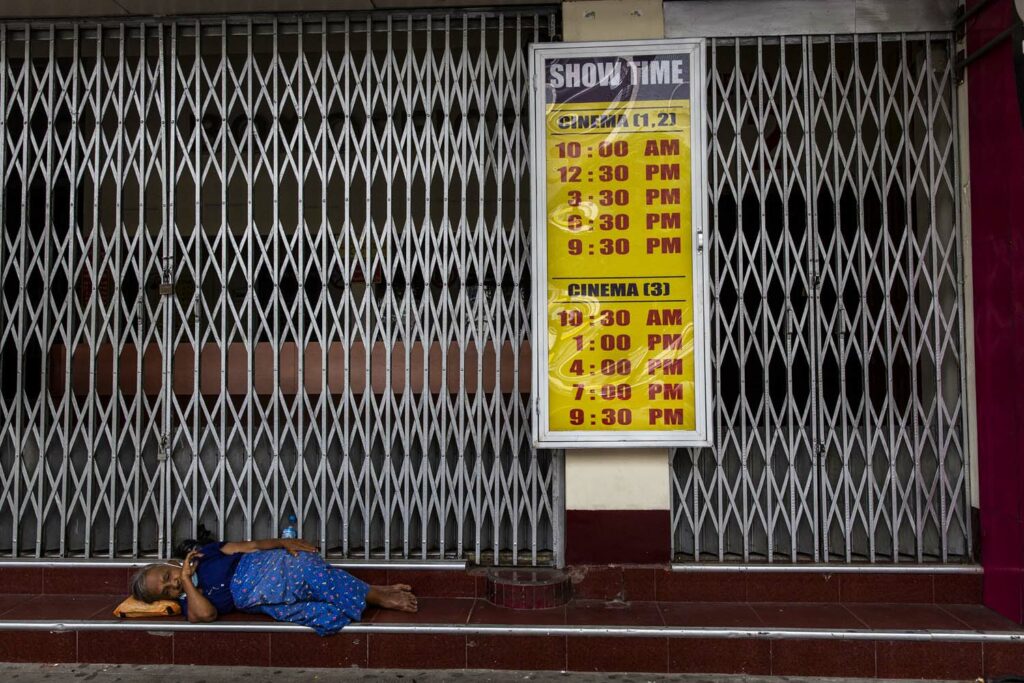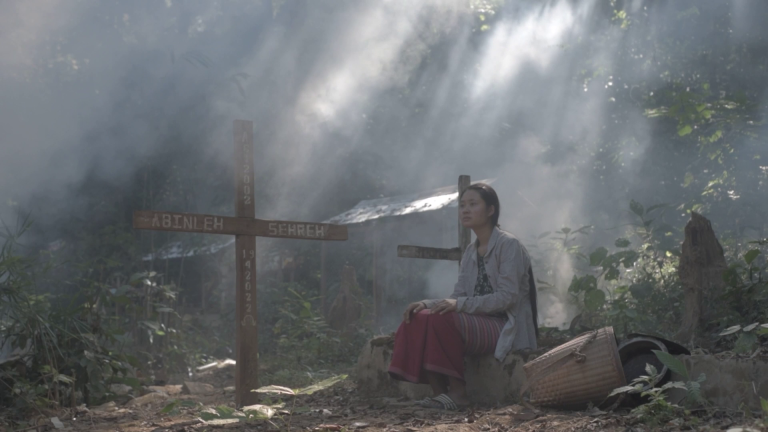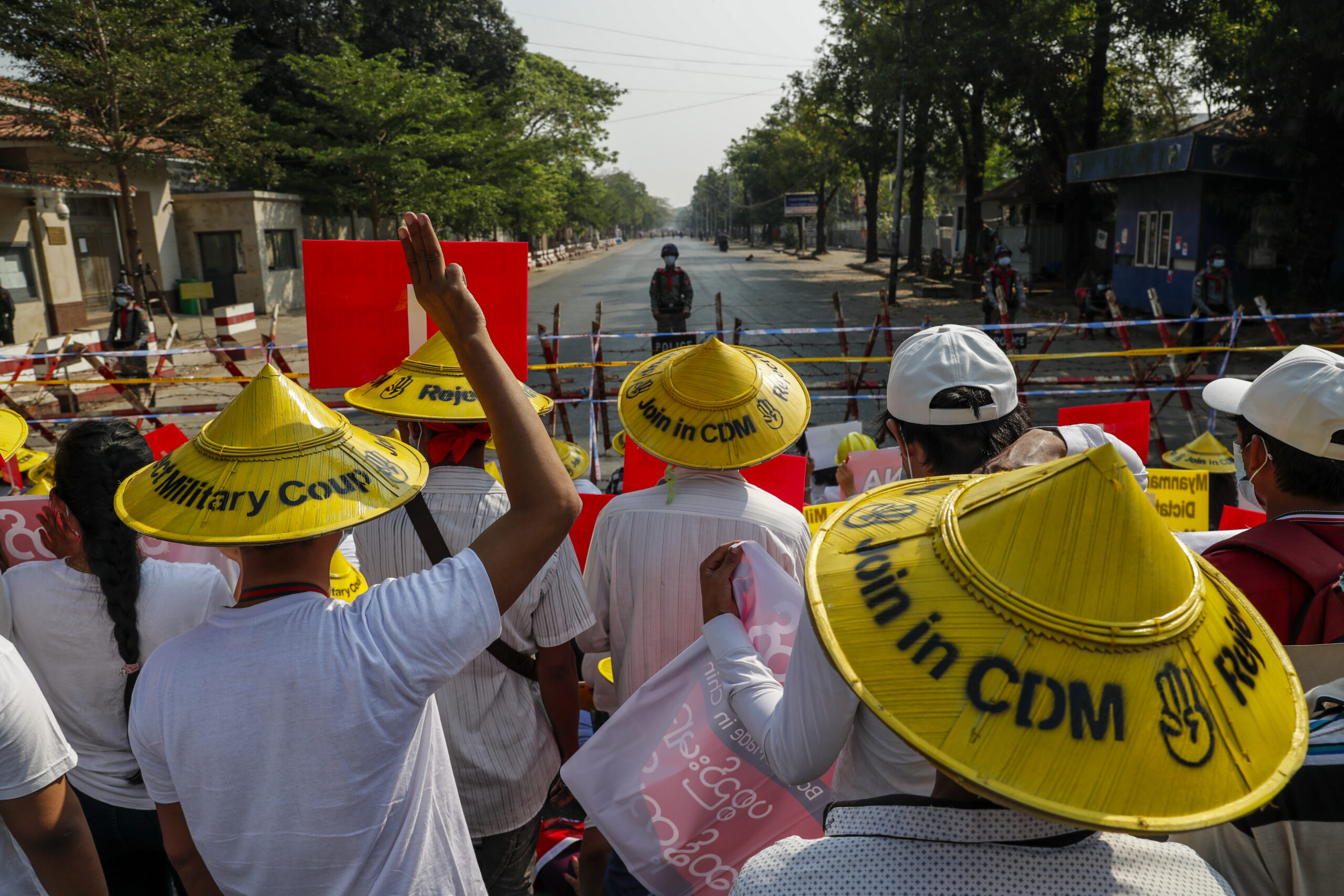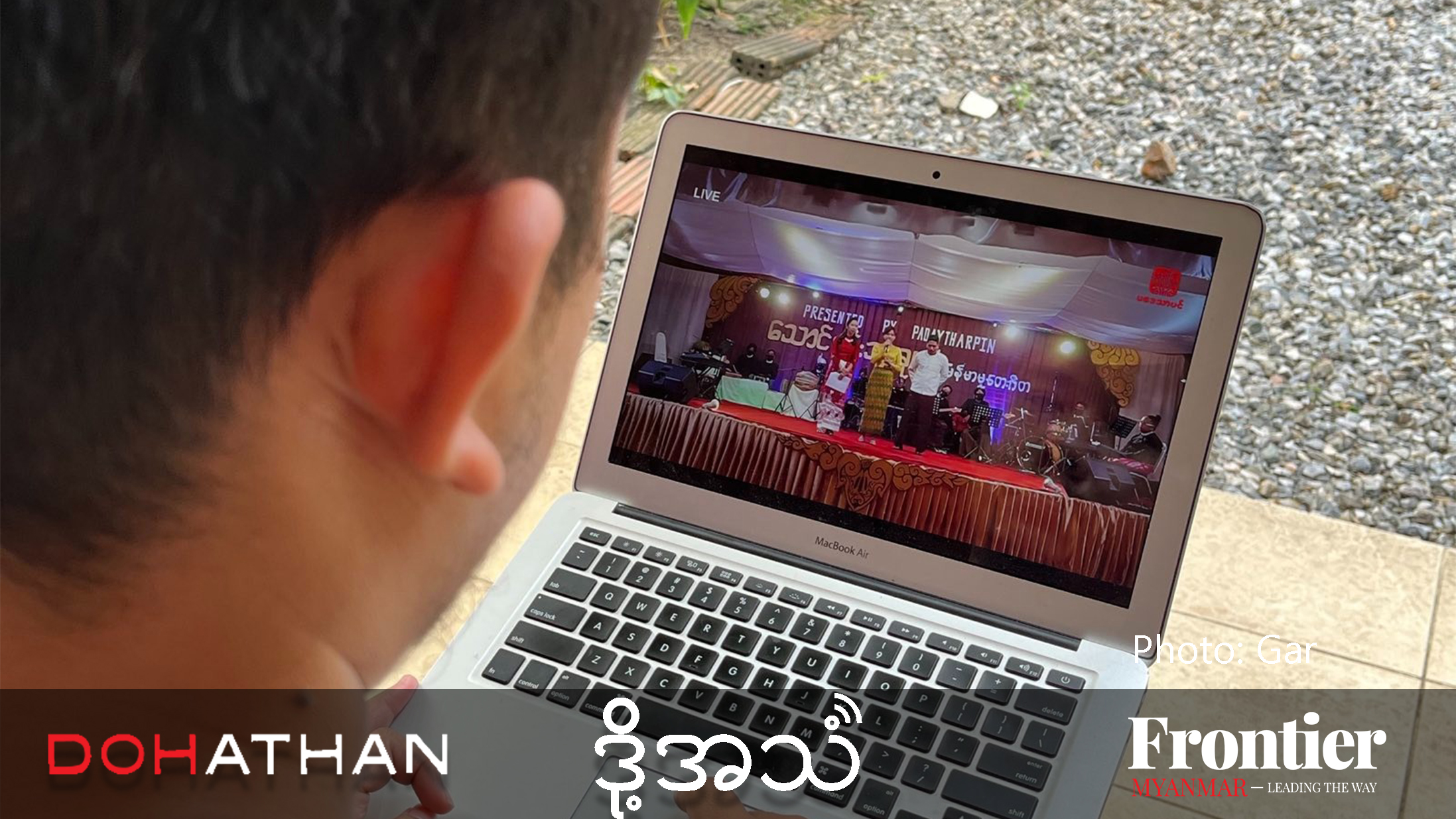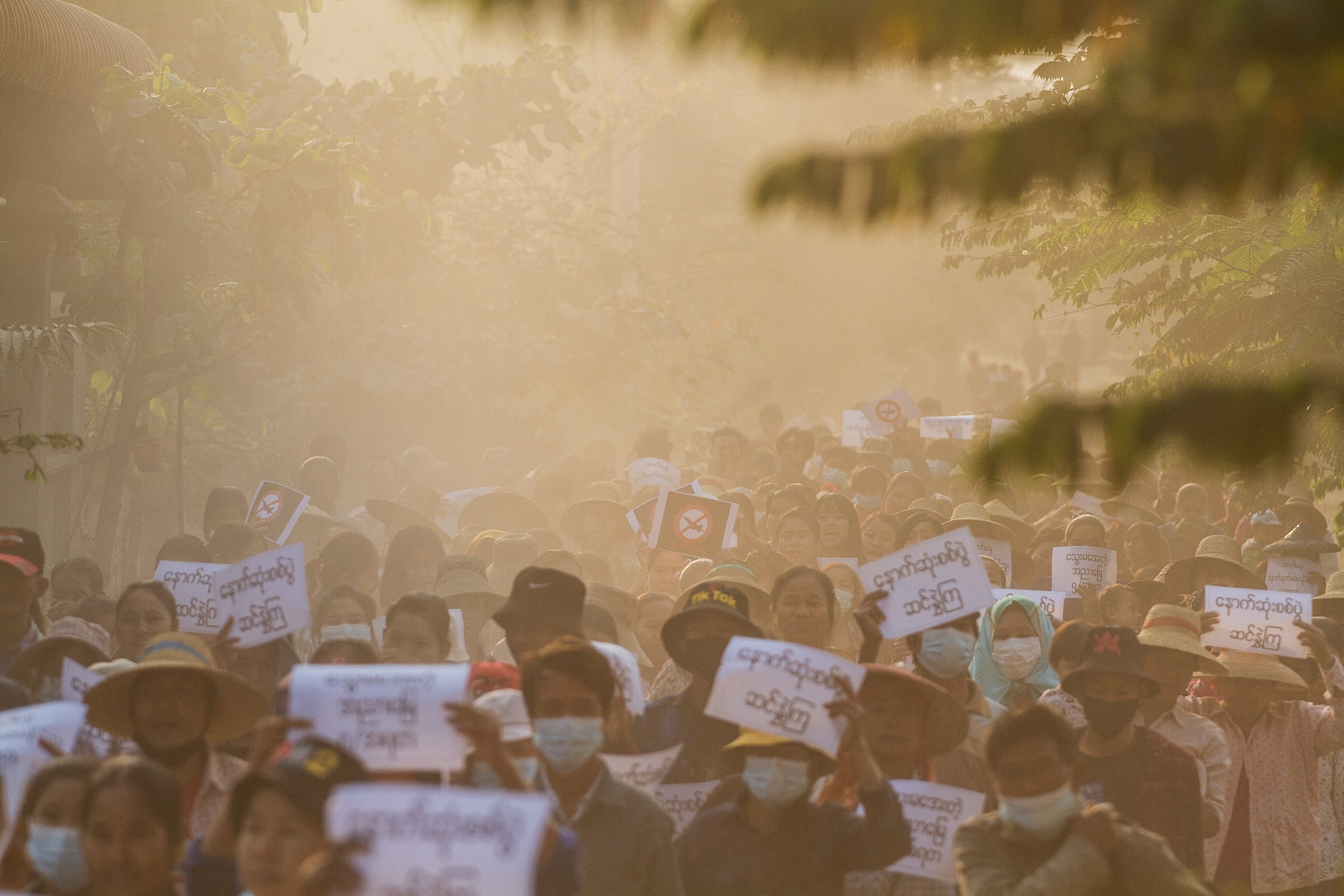After four years, the gaudy glamour of Myanmar’s Oscars is set to return this weekend in the midst of a brutal civil war, with the industry deeply divided between those who are willing to work with the military regime and those who support the resistance.
By FRONTIER
The Myanmar Motion Picture Academy Awards will be held this Saturday in an open-air theatre in the military fortress capital of Nay Pyi Taw, with a grand ceremony to make up for three missed years due to COVID-19 and post-coup instability.
Twelve categories of awards will be announced, covering the period from 2019 to 2022, excluding 2021 when cinemas were closed for the entire year. The Myanmar Motion Picture Organisation is also trying to entice attendees with the promise of Golden Academy brooches for past winners, and a separate Fashion Awards.
“Only artists who are truly worthy” will receive awards, U Aye Kyu Lay, MMPO vice-chair, told Frontier.
The MMPO, as other nominally independent organisations like the Myanmar Comedians Association, has taken a clear pro-junta stance since the 2021 overthrow of the civilian government triggered a brutal civil war. The Academy has repeatedly issued condemnatory statements in the aftermath of attacks by resistance forces, but has stayed silent on atrocities committed by the Tatmadaw.
However, many actors and directors are calling for a boycott of the junta-administered awards, while the regime allegedly uses threats and coercion to force some to attend.
May Wynn-Maung, an Academy Award-winning actress who has lived in the United States for decades and is active in anti-junta protests and fundraising, says artists should think hard before attending.
“An artist cannot be separated from the people. The artist’s survival depends on the support of the public,” she told Frontier.
May Wynn-Maung won her first Best Actress Myanmar Academy Award in 1980 with the film Kyi Pyar, and recently starred in A Sunny Day, a musical based on the coup and the Spring Revolution written by her husband, Thet Win.
The Anti-Junta Alliance Yangon-AJAY, backed by film stars active in the revolution, has urged the public to also participate in the boycott by not watching the ceremony or sharing anything about it on social media.
‘Politics is for politicians’
But the film industry isn’t completely united. Pachi Soe Moe, an award-winning director and patron of the MMPO, defended the awards.
“Politics is for politicians. It’s not our job. We are artists and our work is art. We have a responsibility to prevent the film industry from being destroyed and lost,” he told pro-military Popular News Journal on March 10. The MMPO is chaired by U Kyi Soe Tun, another best director winner.
But critics say it is the regime that has politicised the process. Independent filmmaker Daw Mya Thuzar* said the junta is using the event to manipulate popular artists who hold great influence over the public, as part of its efforts to cement control over an unstable country.
“In my opinion, members of the public or people from the film industry who attend this event are giving official recognition to the military regime that has seized power illegally and is suppressing the people,” she said.
The chair of the awards ceremony organising committee is the junta’s information minister U Maung Maung Ohn, who oversees military propaganda and frequently characterises opponents to military rule as terrorists. On March 28, he said the regime would cover the costs of the event and the golden statue prizes because of the economic impact of COVID-19, and urged artists to attend the ceremony, which he said is being organised according to the “wishes of outstanding artistes”.
The MMPO panel’s shortlist of 29 movies from 2019 includes films featuring actors and directors who have since been charged with incitement under Section 505(a) for opposing the military regime. Some are even still serving prison sentences – the Assistance Association for Political Prisoners told Frontier that 48 people from the arts world are currently in custody.
“At this time, I don’t accept the Academy Awards at all,” said Daung, a film and television actor who opposed the coup and fled to Thailand after being charged under 505(a) in 2021.
Three movies Daung starred in – 1014, Butterfly Mansion and Legendary Rain – are among the movies shortlisted from 2019. While the MMPO claims it never unsealed the winners’ envelopes from 2019, some artists are convinced that opponents of the regime will be snubbed. Others said it’s possible the junta will allow awards to be given to artists in the anti-coup movement to preserve a veneer of impartiality.
“[The MMPO] will be directed by the military government, and I think the outcome will depend on the junta’s decision,” said May Wynn-Maung.
Ko Aung Soe*, another independent filmmaker, said artists who win awards this weekend shouldn’t accept them and, if they do, they “may face punishment” from the public. “The love of the people is more valuable than the academy,” he said.
Aye Kyu Lay said he doesn’t care whether they accept the awards or not.
“If we decide that an award should be given according to the quality of the work, then we will give it. If you decide you don’t want it, that’s it. We are not involved in that aspect,” he said.
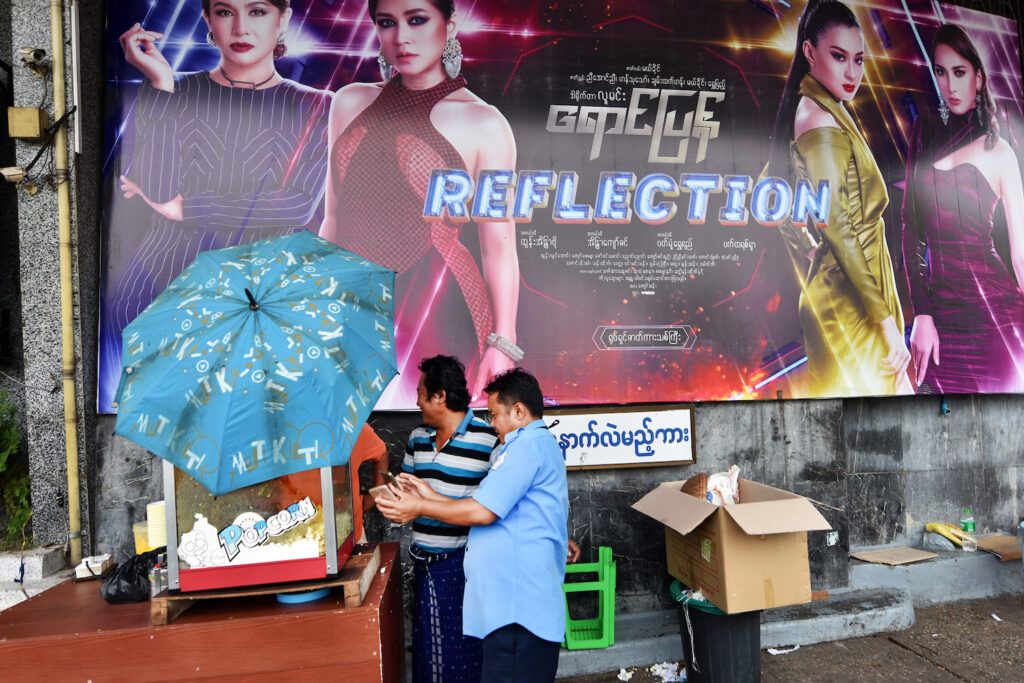
The junta turns the screws
However, it’s clear from some of the tactics being used to induce celebrities to attend that the ceremony is important to the regime. Aye Kyu Lay said he expected more than 1,000 movie industry figures to show up, but it seems not all of them will be there willingly.
Movie figures have been targeted by pro-military Telegram channels, calling for their arrests if they don’t attend – no idle threat given these social media campaigns sometimes precede raids by security forces. Film industry sources, who asked not to be named for security reasons, also told Frontier that artists have been banned from leaving the country ahead of the awards ceremony.
“I heard that some officials from the MMPO met artists and are forcing them to attend the event. The military will hold the event however they can,” Min Maw Kun, an award-winning film actor who is active in the anti-coup movement from Australia, said in an interview with the pro-resistance Voice of the Spring on April 1.
In an echo of the past, another independent filmmaker told Frontier that he heard that those refusing to attend the awards will be barred from working in the industry for three years.
According to MMPO records, the awards ceremony was not held for films made in 1987 because of the 1988 pro-democracy uprising. Those who took part in the protests were reportedly barred from the 1989 Academy Awards and were subsequently forced to recant in order to continue their work in the film industry. But a small number refused, including singer-actress Aye Aye Thin.
A two-time Academy Award winner, Aye Aye Thin lived out the rest of her life as a fortune teller until her death in 2020.
“Did I have to sign as all the others did? Their beliefs were not the same as mine. Youngsters died in front of our eyes. I can still see them being killed. How can I delete this from my memory? I did not sign anything because I couldn’t erase it,” she told Kamayut Media before her death.
May Wynn-Maung, who participated in the 1988 protests, said she had great respect for Aye Aye Thin and for the artists who are currently fighting against the regime.
“I absolutely believe that the artists who are fighting for the revolution now have a stronger spirit than the artists who opposed the junta in 1988,” she said.
An industry in crisis
Meanwhile, the Myanmar movie industry remains on its knees. Cinemas were closed from mid-March 2020 until April last year because of lockdown measures against the spread of COVID-19, while much of the film industry stopped functioning because of the coup and the worsening conflict.
In the last four years, only 138 movies have been released in Myanmar. The vast majority came out in 2019, with just 21 new releases in 2020, none in 2021 and 20 last year.
When cinemas did reopen last year, they remained mostly empty, due to a widespread public boycott against junta efforts to portray the country as stable or normal. Industry sources say audiences have been on the rise this year, with some movie producers starting to turn a profit again, though interest remains well below pre-coup levels.
The military takeover has also created a sharp divergence in the industry, with domestic filmmakers producing heavily censored or pro-regime content, while those in exile make movies that pay homage to the resistance or criticise the military’s human rights abuses.
“Censorship has become much stricter since the coup,” said an independent filmmaker who requested anonymity. He said all movies and TV shows, including pro-military content, are subjected to intense scrutiny.
“For example, you can’t even use the word ‘dog’ in movies anymore,” he said. Since the violent crackdowns on peaceful protests in 2021, it has become common to hear soldiers referred to as sit kway or “military dogs”.
Before the coup, during the period of democratic reforms from 2011 to 2021, censorship was lifted for print media, but not for cinema or television. Films still needed the approval of a censorship board to be released, but its officials were less strict than under military rule.
New movies and TV dramas broadcast on junta-controlled channels feature actors who have remained aloof from the resistance, and some have a clear pro-military slant.
Ahead of Armed Forces Day, movie theatres screened a propaganda film called A Red Blanket, featuring Academy Award winning actors Yan Aung, Soe Myat Thuzar and Soe Myat Nandar. The movie depicts the military heroically protecting innocent Kachin villagers, who support them in the war against a brutal and tyrannical Kachin Independence Army. In reality, the military faces widespread allegations of systematic human rights abuses against the Kachin people.
Ko Nay Myo Aung*, a movie-goer in Yangon’s Tarmwe Township, said the quality of popular films has dipped noticeably since the coup. Like some others, he has begun watching movies at cinemas again in recent months but said this shouldn’t be taken as a sign that opposition to the military has waned.
“We don’t watch movies to support artists who support the military; we just watch to relax,” he said, adding that he avoids watching anything that is too blatantly pro-military.
Meanwhile, abroad, dissident Myanmar films are generating buzz on the international award circuits.
Myanmar Diaries – a hybrid film featuring documentary footage of the protest crackdowns as well as dramatised vignettes of ordinary people suffering under military rule – won multiple awards at the Berlin International Film Festival last year.
Rock star-turned-director Lynn Lynn, wanted in Myanmar for incitement, also achieved international recognition in March.
Two of his short films about the resistance were honoured in a monthly rating by Cannes World Film Festival, meant to highlight hidden gems and emerging talents. One of them – The Beginning, starring Daung and Lynn Lynn’s wife Chit Thu Wai – was also recognised as the Best Short Film at the monthly Korea International Short Film Festival.
“Spirit and art cannot be imprisoned,” Chit Thu Wai wrote on Facebook.
*denotes use of a pseudonym for security reasons


